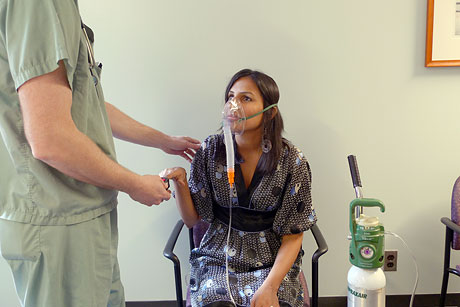Georgia CTSA's Biostatistics, Epidemiology, & Research Design (BERD) Program & Georgia CTSA Clinical Research Centers Supports Cystic Fibrosis Findings

Vin Tangpricha, MD, PhD, professor of medicine and director, Fellowship Program, Division of Endocrinology, Metabolism, and Lipids, Emory University School of Medicine, continues his collaboration with Georgia Clinical & Translational Science Alliance’s (Georgia CTSA) Biostatistics, Epidemiology, & Research Design (BERD) program to design an ongoing pilot study examining the role of vitamin D deficiency in gut and lung microbiota in cystic fibrosis patients.
Cystic fibrosis (CF) is a progressive, genetic disease that impacts lung function over time. A defective gene in patients causes a thick mucosal buildup in the lungs, pancreas, and other organs, clogging the airways and increasing likelihood of respiratory failure. With excess mucus in the pancreas, the body becomes unable to break down food and other vital nutrients. This can lead to malnutrition and poor growth.
This clinical trial enrolled 41 subjects with CF who were classified in two groups: vitamin D insufficient and vitamin D sufficient. Subjects with vitamin D insufficiency were randomized to receive a dose of oral vitamin D3 or placebo weekly for 12 weeks. The study proposes that vitamin D insufficiency is associated with alterations in microbiota composition that may promote inflammation and that supplementation with vitamin D has potential to impact microbiota composition. A separate study enrolled hospitalized adults with CF on a high-dose vitamin D3 versus placebo, finding that the treatment produced an anticatabolic effect that inhibited the breakdown of muscle. A BERD biostatistician and bioinformatician are currently assisting with further analysis.
Tangpricha recently completed a multi-center study that enrolled 91 hospitalized adults with CF on a high-dose vitamin D3 versus placebo, to determine if vitamin D improves survival and clinical outcomes in these patients. The trial used the nursing, laboratory, and bionutrition resources of the Georgia CTSA Clinical Research Centers (GCRCs) at Emory University Hospital . Results for this study are forth-coming.
A key goal of the BERD program is to provide value-added assistance to markedly improve the quality of the translational and clinical research of Emory University, Morehouse School of Medicine (MSM) Georgia Institute of Technology (Georgia Tech), and University of Georgia (UGA) investigators. This is accomplished by having highly trained, service oriented BERD personnel from Emory’s Rollins School of Public Health, MSM’s Clinical Research Center & Research Center for Clinical & Translational Research, Georgia Tech’s Stewart School of Industrial and Systems Engineering, and UGA’s College of Public Health available to assist early career researchers in a timely manner.
The Georgia CTSA Clinical Research Centers are designed to provide the necessary infrastructure for investigators conducting clinical research and is part of Georgia CTSA. The center improves the ability of clinical researchers to perform innovative research while providing patients and their families with increased access to leading-edge clinical trials.
Learn more information on clinical sites
The Georgia CTSA is an inter-institutional magnet that concentrates basic, translational, and clinical research investigators, community clinicians, professional societies, and industry collaborators in dynamic clinical and translational research projects. Emory engaged three of its close academic partners – MSM, Georgia Tech, and UGA – to form the Georgia CTSA. This partnership, a strategic multi-institutional alliance, offers compelling, unique, and synergistic advantages to research and patients statewide.
Georgia CTSA is one of nearly 60 in a national consortium striving to improve the way biomedical research is conducted across the country. The consortium, funded through the National Center for Advancing Translational Sciences (NCATS) and the National Institutes of Health’s Clinical and Translational Science Awards, shares a common vision to translate laboratory discoveries into treatments for patients, engage communities in clinical research efforts, and train the next generation of clinical investigators.